[EXP] Balancing nature and coastal protection with sustainable local development Pellworm, a small North Frisian island below sea level.
Ökologisch Wirtschaften - Ecological Economy - a civil society organisation promoting organic agriculture, on farm tourism, energy saving and renewable energy
Rural topic(s): Conservation and management of natural resources, Renewable energy and eco-housing, Rural entrepreneurship and diversification of activities
Type: Success story
Date of writing: June 24, 2009
Author(s) of this page: Hannes Lorenzen
Organization(s): Ökologisch Wirtschaften! e.V.
Summary:
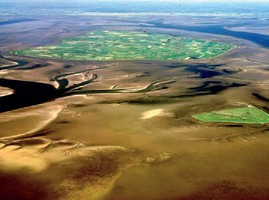
Pellworm island has chosen to become a « green island » in the 80’s : it has been the first testing area for windmills towards auto-sufficiency. Ökologisch Wirtschaften, a local association committed to the sustainable development of the island, promoted various projects in order to diversify the local economy: renewable energy, organic farming, diversification and farm products processing (wool, agritourism), seafood processing. Today the island is one of the leading experiences in Germany and Europe concerning integrated production and use of renewable energies.
Text:
Regional background
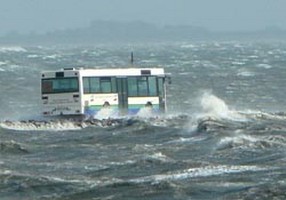
Pellworm is a North Frisian island located in the German Wadden Sea National Park. Much of the surface area lies 1.0 m below sea level. The island is located in mudflats and protected by dykes against the sea flowing in. Agriculture, tourism and service are the main economic sectors. On Pellworm, you will only find small supermarkets, some shops and a few restaurants. On farm soft tourism is an important source of income. Nearly every household offers tourist accommodation facilities. Tourists visiting the island are attracted by the quietness, the pure air, and the surrounding national park. The island is well established as a « green island » as it has been involved in renewable energy for a long time. In the early 80’s the first testing area for windmills was established on Pellworm. Today the island is one of the leading experiences in Germany and Europe concerning integrated production and use of renewable energies.There has been an important structural change within agriculture. With additional costs for transport to the mainland and small processing plants closing also many of the small farms were given up. Along with this, the demographic structure has changed. The percentage of people over 60 years old is increasing including many pensioners choosing the island as their secondary residence.
Initiators of the project
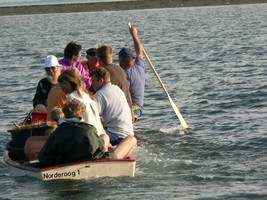
Ökologisch Wirtschaften! In 1990 OW was founded as a non-profit organisation by a group of concerned farmers, business people, housewives, craftsmen, teachers, fishermen, and local doctors. « Okologisch Wirtschaften! » means « run the economy in an ecologically friendly way”. The strategy for local development on the island is based on the concept that all economic (and social) sectors on the island depend on each other and must closely act together. The goal was to halt the ongoing loss of population, and to fight the imminent economical crisis of the island by means of ecologically friendly development.
Project activities with respect to Sustainable Development
The main topical aims of OW are:
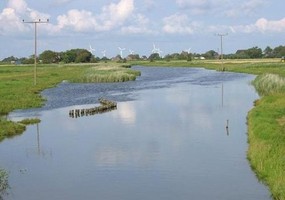
-
Promoting ecologically friendly agriculture, tourism and energy supply and to share the experience with other islands and sustainable development projects.
-
Processing and refining local products in the island - and to improve local and short distance marketing of these products.
-
Improving energy saving in all households and businesses of the island and integration of the use of renewable energies in order to become a CO2 free island economy
Examples
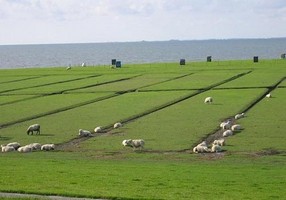
- Direct marketing of organic products. In order to halt the dangerous downward spiral forcing farmers to give up their farms, ÖW has encouraged many farmers to convert to organic production and to join into a direct marketing cooperation for local food. The local dairy facilities are now gathering organic milk for separate marketing which at the moment of the European milk crisis offers a considerably higher price for organic farmers as compared to conventional prices.
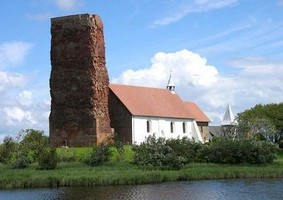
- Turning geographic and economic disadvantage into ecological and economic advantage. Pellworm was a partner project with the county of Schleswig-Holstein at EXPO 2000 within the project « Village 2000 and has received the region’s sustainable development award. Pellworm was involved in the sustainable mystery tour of Forum Synergies. It is today involved in the regional rural development programme of the North Frisian Islands region « Uthlande » where it plays a pioneer role in renewable energies. There is also very constructive cooperation between the local government of the island and various local associations.
Future challenges and perspectives
ÖW is currently looking at possibilities of using the experience in renewable energies for educational purposes (energy academy). The organisation is also establishing new contacts to partner islands like Samsô in Denmark and Tershelling in the Netherlands to support each other in further initiatives. They are also proud of a fleet of young fishermen, who intend to process their shrimps and fish on the island, thus replacing the appalling practice of European fish business which currently sends the entire shrimp catch via airplane transfer to Morocco for peeling…And they are also participating in a broader island initiative on better resource management called « from cradle to cradle ».
Notes:
Source:
Website: www.oeko-verein-pellworm.de
Contact:
Ökologisch Wirtschaften! e.V.
Uwe Kurzke
UKU(a)akkupellworm.de
Download:
Informations:
Scale of intervention : Local
Keywords: renewable energy, organic farming, short food chain, direct selling, agritourism, locally-based economy, diversification of economic activities, island, rural depopulation, job creation, solar energy, wind energy, fish processing, wool processing, livestock farming
Places: Germany
Actors: NGO, association
Methods: community-led initiative, programme/project management
